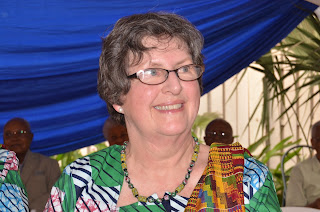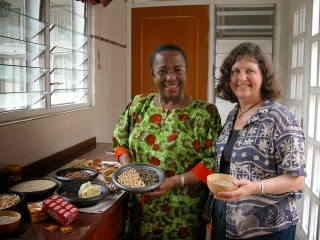The word for "crab" in Twi is
kɔtɔ or
ɔkɔtɔ or
okoto. Kotokyim is
the Akan name for "crab stew" and
akontoshi refers to a classic Ghanaian stuffed crab dish topped with bread crumbs. Barbara Baeta of Flair Catering has adjusted the traditional recipe to create an elegant, but easy, dish that can be made from crab (or lobster) meat, but also using less expensive canned tuna fish. Following her lead, I have used
Irish baking dish seashells to lend a nice ambiance to the dish. It can also be served in a crab shell or a ramekin.
If you have access to fresh crabs, good for you. I do not, and since I'm not serving this as a first course at a fancy luncheon or dinner party, and the crab would cost me at least $20 to buy, I prepared mine today using a can of chunk tuna in water.
Recipe #94: Contemporary Akontoshi ("stuffed crab")
Ingredients:
- 1 slice of wholewheat (brown) bread, to make about 1/2 cup of bread crumbs
- about 1 cup of Ghanaian gravy (see below for directions)
- about 6 ounces of fresh crab (or lobster meat), or 1 6 oz can of solid tuna fish (preferably in water), drained and flaked with a fork or your fingers
Special equipment:
- 4 or 5 (oven proof) shells or ramekins to hold the stew
Directions:
- Put a slice of whole-wheat bread into a blender and pulse the blender to make it into crumbs. If it is too fresh and soft, let it sit out for a while to dry, or pop it into a toaster for a minute. You should have about 1/2 cup of crumbs.
- Put a clean, heavy pan on the stove and toast the breadcrumbs in it over medium heat until they are browned and crisp, stirring or shaking the pan frequently. Remove the pan from heat and pour the crumbs into a bowl so they do not continue to cook and burn, and set them aside.
If you do not already have some
Ghana-style gravy on hand, make some using:
- 2 tablespoons of vegetable oil (such as canola, or peanut)
- l/2 medium onion, finely chopped (or grated) to get about 1/2 cup
- a tomato, seeded and grated (or ground), peeling discarded if grated (for directions on grating, see the eggplant stew recipe), to get about 1/2 cup with juice (do not rinse the peelings with any water)
- a heaping teaspoon of tomato paste
- 1 large clove of garlic (or 2 small), pressed (or ground)
- 1 teaspoon of peeled and grated or ground fresh ginger
- fresh ground (or minced, but I prefer grinding in a blender) hot pepper to taste (or substitute one or two minced, grated or ground tablespoons of a sweet bell pepper, and/or a half teaspoon or more of dried ground hot chili pepper)
- a little salt to taste
- a teaspoon or so of your choice of additional seasoning, dried ground shrimp, white pepper, no-salt seasoning, etc.(optional; I used 1/4 teaspoon dried ground shrimp.
To make the gravy: Prepare the onion, tomato, ginger, pepper, and garlic. Put a frying pan on the stove to heat on medium heat, then add the oil and chopped or grated onion. Saute for a few minutes, then add the garlic, ginger, and fresh red (or bell) pepper. Stir well and cook for another minute or two, and add the tomatoes, tomato paste and other seasonings you are using. Cook for a few minutes until well blended. Add the flaked tuna fish (or crab) to the gravy and stir well. Let it cook for several minutes for the flavors to blend and thicken as some of the liquid cooks out. (If using fresh crab meat, make sure it is cooked through). Taste and adjust seasonings.
To fill the shells (crab or seashells) or ramekins: You should have a little over a cup of stew, enough for 4 shells filled with 1/4 cup of stew each, or 5 shells filled with 1/3 cup each (that's what I did). Sprinkle a couple of teaspoons of the bread crumbs over the stew on each shell (or a little more if you like).
Heat through in a moderate oven (350 degrees For 180 degrees C) for about 10 minutes, or just until heated through, making sure the crumbs do not burn (I actually used a slightly lower temperature in my toaster broiler oven).
Voila! A delicious, impressive first course to a meal. Even better, you can prepare the stew and the bread crumbs ahead of time, and just stuff and heat them at the last minute. They should be served warm.
Variations: Ghanaians would likely use more oil in the gravy than I suggest. Sometimes butter replaces the oil. Sometimes cheese is added.




































